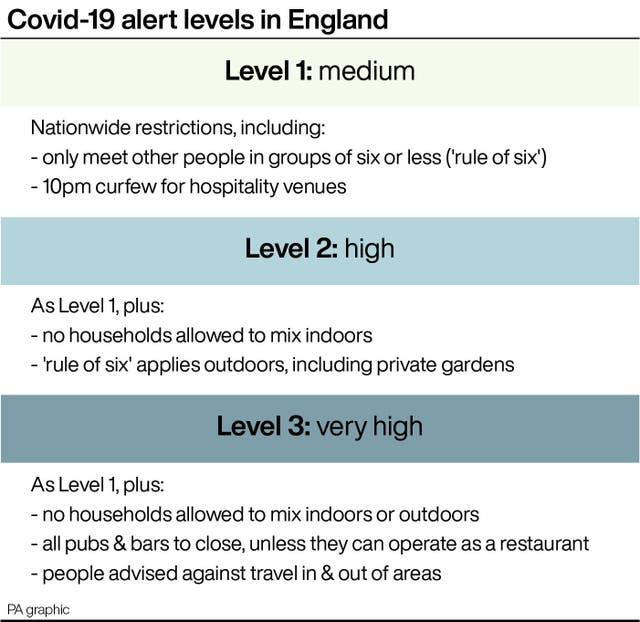Prime Minister suffers major Tory backbench rebellion over 10pm curfew
A group of backbench Conservatives forced a division to register their disapproval over the curfew affecting pubs and restaurants in England.

Boris Johnson has suffered a major Tory backbench rebellion over the 10pm hospitality curfew, amid a growing backlash against Government coronavirus restrictions.
MPs approved the Government’s new three tier alert system for England without the need for a formal vote.
But a group of backbench Conservatives forced a division to register their disapproval over the curfew affecting pubs and restaurants in England.

Yet this did not stop 42 Tory MPs rebelling to retrospectively oppose the curfew, which was approved by 299 votes to 82 – majority 217.
A further two Conservative MPs acted as tellers for the noes, bringing the rebellion up to 44, while 298 Tories voted in favour.
A total of 23 Labour MPs also opposed the measure, including former leader Jeremy Corbyn.
Health Secretary Matt Hancock earlier conceded the curfew was a “matter of policy choice” in order to keep schools and workplaces open, rather than something driven by the science.
He claimed there is “direct and approximate evidence” for the positive impact of the limits on pubs and restaurants, citing a fall in alcohol-related A&E admissions late at night.
But Mr Hancock insisted the Government’s desire to protect education and work “as much as is possible” meant they had to take measures against socialising to try to slow the spread of Covid-19 transmission.
Appearing in the Commons to move regulations to implement England’s new three tiers of restrictions, Mr Hancock was challenged by Tory MP Huw Merriman (Bexhill and Battle) on whether the scientific evidence on curfews shows the positives outweigh the negatives.
Mr Hancock said there has been a decrease in A&E admissions linked to alcohol, before he argued about the need to reduce the amount of social contact to control the virus.
He explained: “We’re trying to protect, as much as is possible, education and protect, as much as is possible, work, essentially that leaves socialising as the other part of life, of activity where people transmit the virus.
“And so it is therefore understandable that governments around the world and around this United Kingdom, governments of all different political persuasions, have all come to broadly the same conclusion, that it is necessary to restrict socialising, because that way we reduce the transmission with the least damage to education and the economy.
“So while there is both direct and approximate evidence for the positive impact of this measure, there is also the strategic point which is, if we want to control the virus and we weren’t to do this, we’d have to do something else, and we want, as a matter of policy choice, to protect education and protect work.”

Imran Ahmad Khan, Tory MP for Wakefield, warned the tiered restrictions would “break” his constituents.
He added: “My inbox is swamped by people imploring me to help the Government to realise that their businesses will be damned.
“I have not received one letter or email asking me to commend the Government on its proposals.”
Tory former minister Sir Christopher Chope referred to evidence from Sweden, saying their approach was “clear and simple, it is to trust the people and make them responsible for their own health and welfare”, and added: “The collateral damage which is being caused is going to actually reduce life expectancy further.”
Sir Edward Leigh, another Tory former minister, said: “We simply cannot go on bailing out businesses, we are going bankrupt… We have to allow people to work and therefore I think the whole approach needs to be changed.”
Conservative MP Chris Loder (West Dorset) added: “We are faced with this evening a motion that will in effect close our village pubs at 10 o’clock.

Tory Richard Drax (South Dorset) warned: “We are paying, as a country, a terrible, terrible price economically, socially, mentally, financially, health – millions of our constituents out there now are suffering in unimaginable ways.”
Tom Tugendhat, Conservative MP for Tonbridge and Malling, backed the need for consistency in the Government’s plan over the coming months and years.
He said: “At the moment it’s off the bus, on the bus, off the bus, on the bus, and for those of us who served in uniform, you know how much time that wastes.”





